List of grand dukes of Tuscany facts for kids
Quick facts for kids Grand Duke of Tuscany |
|
|---|---|
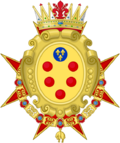
Coat of arms (1569–1737)
|
|
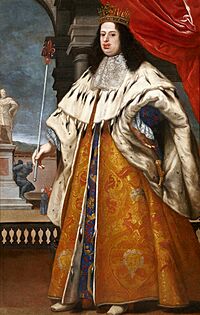
|
|
| Details | |
| First monarch | Cosimo I de' Medici |
| Last monarch | Leopold II (de jure) Ferdinand IV (de facto/titular) |
| Formation | 27 August 1569 |
| Abolition | 16 August 1859 |
| Residence | Palazzo Pitti |
The title of Grand Duke of Tuscany was a special royal title given to the rulers of Tuscany, a region in Italy. This important title was created on August 27, 1569. It was given by Pope Pius V to Cosimo I de' Medici. Cosimo was a very important member of the famous House of Medici family.
His official crowning ceremony happened in Rome on March 5, 1570. The Pope himself placed the crown on Cosimo's head. The Medici family had ruled Florence, the main city in Tuscany, since 1434. Before becoming Grand Dukes, they were known as Lords of Florence and then Dukes. The title of Grand Duke was a higher honor. It showed that the Medici family had even more power in Tuscany.
The Grand Dukes lived in a beautiful palace called the Palazzo Pitti in Florence. The Medici family bought this palace in 1549.
Contents
How Tuscany Became a Grand Duchy
For a long time, the region of Tuscany was divided. It had many independent cities. These included Pisa, Florence, Siena, and Lucca. Each city ruled itself.
Over time, Florence grew stronger and bigger. It started to bring other parts of Tuscany under its control. This made the region more united. This unity became even clearer when the Grand Duchy of Tuscany was created in 1569. Eventually, the Grand Duchy included almost all of what is now Tuscany. Later, it became part of the Kingdom of Italy.
Medici Grand Dukes of Tuscany (1569–1737)
The Grand Duchy of Tuscany was a time when most of the region was ruled by one leader. This was a big change after many centuries of separate cities. The Grand Duchy covered almost all of modern Tuscany. Some small areas, like the Republic of Lucca, remained independent.
Here are the Grand Dukes from the Medici family:
| Portrait | Name | Lifespan | Reign | Consorts | Succession |
|---|---|---|---|---|---|
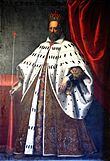 |
Cosimo I de' Medici | 12 June 1519 – 21 April 1574 | 21 August 1569 – 21 April 1574 | (1) Eleanor of Toledo 29 June 1539 Florence 11 children (2) Camilla Martelli 1570 1 daughter |
First Grand Duke of Tuscany. |
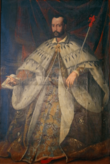 |
Francesco I de' Medici | 25 March 1541 – 19 October 1587 | 21 April 1574 – 17 October 1587 | (1) Joanna of Austria 18 December 1565 Florence 8 children (2) Bianca Cappello 10 June 1579 1 son |
Son of Cosimo I |
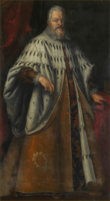 |
Ferdinando I de' Medici | 30 July 1549 – 3 February 1609 | 19 October 1587 – 7 February 1609 | Christina of Lorraine 1589 Florence 9 children |
Son of Cosimo I |
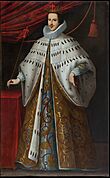 |
Cosimo II de' Medici | 12 May 1590 – 28 February 1621 | 17 February 1609 – 28 February 1621 | Maria Maddalena of Austria 1608 8 children |
Son of Ferdinando I |
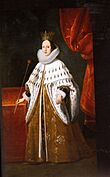 |
Ferdinando II de' Medici | 14 July 1610 – 23 May 1670 | 28 February 1621 – 23 May 1670 | Vittoria della Rovere 6 April 1637 4 children |
Son of Cosimo II |
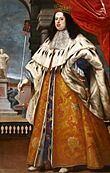 |
Cosimo III de' Medici | 14 August 1642 – 31 October 1723 | 23 May 1670 – 31 October 1723 | Marguerite Louise d'Orléans 17 April 1661 Louvre 3 children |
Son of Ferdinando II |
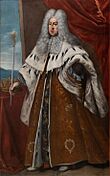 |
Gian Gastone de' Medici | 24 May 1671 – 9 July 1737 | 31 October 1723 – 9 July 1737 | Anna Maria Franziska of Saxe-Lauenburg 2 July 1697 Düsseldorf no issue |
Son of Cosimo III |
Habsburg-Lorraine Grand Dukes (1737–1801)
After the Medici family line ended, a new family took over. These were the Habsburg-Lorraine Grand Dukes. They began ruling Tuscany in 1737.
Here are the Grand Dukes from the Habsburg-Lorraine family:
| Portrait | Name | Lifespan | Reign | Consorts | Succession |
|---|---|---|---|---|---|
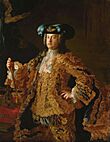 |
Francesco II Stefano | 8 December 1708 – 18 August 1765 | 12 July 1737 – 18 August 1765 | Maria Theresa 12 February 1736 Vienna 16 children |
Became ruler of Tuscany through a special agreement called the Treaty of Vienna. |
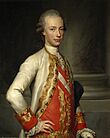 |
Leopoldo I | 5 May 1747 – 1 March 1792 | 18 August 1765 – 22 July 1790 | Maria Luisa of Spain 16 February 1764 Madrid 16 children |
Second son of Francesco II Stefano. |
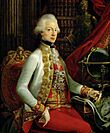 |
Ferdinando III | 6 May 1769 – 18 June 1824 | 22 July 1790 – 3 August 1801 | (1) Luisa of Naples and Sicily 19 September 1790 Vienna 6 children (2) Maria Ferdinanda of Saxony 6 May 1821 Florence no issue |
Second son of Leopoldo I. |
Kings of Etruria (1801–1807)
Around 1801, Napoleon Bonaparte changed things in Tuscany. He created a new kingdom called the Kingdom of Etruria. He put the Bourbon-Parma family in charge as "Kings" instead of Grand Dukes. This kingdom included much of modern Tuscany.
Here are the Kings of Etruria:
| Portrait | Name | Lifespan | Reign | Consorts | Succession |
|---|---|---|---|---|---|
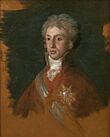 |
Ludovico I | 5 July 1773 – 27 May 1803 | 21 March 1801 – 27 May 1803 | Maria Luisa of Spain 25 August 1795 Madrid 2 children |
Grandson of Francesco II Stefano. |
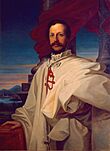 |
Ludovico II | 22 December 1799 – 16 April 1883 | 27 May 1803 – 10 December 1807 | Maria Teresa of Savoy 5 September 1820 Lucca 2 children |
Son of Ludovico I. |
Tuscany was then taken over by France from 1807 to 1814. Napoleon's sister, Elisa Bonaparte, was given the honorary title of Grand Duchess of Tuscany. However, she didn't actually rule the region.
Habsburg-Lorraine Grand Dukes (1814–1860)
After Napoleon's time, the Habsburg-Lorraine family returned to rule Tuscany. They were Grand Dukes again from 1814 until 1860.
Here are the Grand Dukes from the Habsburg-Lorraine family during this period:
| Portrait | Name | Lifespan | Reign | Consorts | Succession |
|---|---|---|---|---|---|
 |
Ferdinando III | 6 May 1769 – 18 June 1824 | 27 April 1814 – 18 June 1824 | (1) Luisa of Naples and Sicily 19 September 1790 Vienna 6 children (2) Maria Ferdinanda of Saxony 6 May 1821 Florence no issue |
Restored to the throne. |
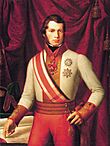 |
Leopoldo II | 3 October 1797 – 29 January 1870 | 18 June 1824 – 21 July 1859 | (1) Maria Anna of Saxony 28 October 1817 Dresden 4 children (2) Maria Antonia of the Two Sicilies 7 June 1833 Naples 10 children |
Son of Ferdinando III. |
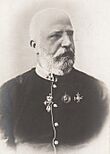 |
Ferdinando IV | 10 June 1835 – 17 January 1908 | 21 July 1859 – 22 March 1860 | (1) Anna of Saxony 24 November 1856 Dresden 2 daughters (2) Alice of Parma 11 January 1868 Frohsdorf 10 children |
Son of Leopoldo II. |
Leopoldo II was forced to leave Tuscany by a revolution twice. He gave up his title to his son, Ferdinando IV, on July 21, 1859. However, Ferdinando IV was never truly accepted as ruler in Tuscany. He was removed from power on August 16. Tuscany then became part of Piedmont-Sardinia on March 22, 1860.
See also
 In Spanish: Anexo:Soberanos de Toscana para niños
In Spanish: Anexo:Soberanos de Toscana para niños
- List of heads of state of Florence (1434 to 1569)
- List of Tuscan consorts
- Grand Duchy of Tuscany
- History of Tuscany

